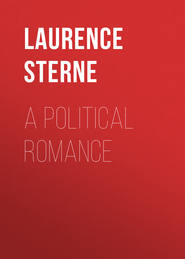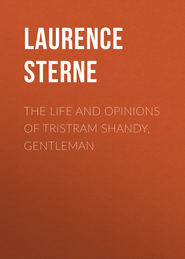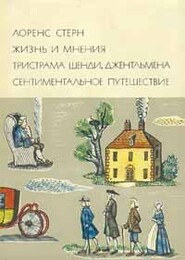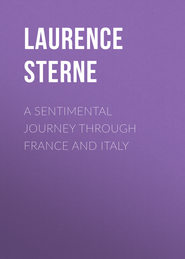По всем вопросам обращайтесь на: info@litportal.ru
(©) 2003-2025.
✖
Tristram Shandy
Автор
Год написания книги
2019
Настройки чтения
Размер шрифта
Высота строк
Поля
In any other family dishonour, my father, I believe, had as nice a sense of shame as any man whatever;—and neither he, nor, I dare say, Copernicus, would have divulged the affair in either case, or have taken the least notice of it to the world, but for the obligations they owed, as they thought, to truth.—Amicus Plato, my father would say, construing the words to my uncle Toby, as he went along, Amicus Plato; that is, Dinah was my aunt;—sed magis amica veritas—but Truth is my sister.
This contrariety of humours betwixt my father and my uncle, was the source of many a fraternal squabble. The one could not bear to hear the tale of family disgrace recorded,—and the other would scarce ever let a day pass to an end without some hint at it.
For God’s sake, my uncle Toby would cry,—and for my sake, and for all our sakes, my dear brother Shandy,—do let this story of our aunt’s and her ashes sleep in peace;—how can you,—how can you have so little feeling and compassion for the character of our family?—What is the character of a family to an hypothesis? my father would reply.—Nay, if you come to that—what is the life of a family?—The life of a family!—my uncle Toby would say, throwing himself back in his arm chair, and lifting up his hands, his eyes, and one leg—Yes, the life,—my father would say, maintaining his point. How many thousands of ’em are there every year that come cast away, (in all civilized countries at least)—and considered as nothing but common air, in competition of an hypothesis. In my plain sense of things, my uncle Toby would answer,—every such instance is downright Murder, let who will commit it.—There lies your mistake, my father would reply;—for, in Foro Scientiae there is no such thing as Murder,—’tis only Death, brother.
My uncle Toby would never offer to answer this by any other kind of argument, than that of whistling half a dozen bars of Lillebullero.—You must know it was the usual channel thro’ which his passions got vent, when any thing shocked or surprized him:—but especially when any thing, which he deem’d very absurd, was offered.
As not one of our logical writers, nor any of the commentators upon them, that I remember, have thought proper to give a name to this particular species of argument.—I here take the liberty to do it myself, for two reasons. First, That, in order to prevent all confusion in disputes, it may stand as much distinguished for ever, from every other species of argument—as the Argumentum ad Verecundiam, ex Absurdo, ex Fortiori, or any other argument whatsoever:—And, secondly, That it may be said by my children’s children, when my head is laid to rest,—that their learn’d grandfather’s head had been busied to as much purpose once, as other people’s;—That he had invented a name, and generously thrown it into the Treasury of the Ars Logica, for one of the most unanswerable arguments in the whole science. And, if the end of disputation is more to silence than convince,—they may add, if they please, to one of the best arguments too.
I do, therefore, by these presents, strictly order and command, That it be known and distinguished by the name and title of the Argumentum Fistulatorium, and no other;—and that it rank hereafter with the Argumentum Baculinum and the Argumentum ad Crumenam, and for ever hereafter be treated of in the same chapter.
As for the Argumentum Tripodium, which is never used but by the woman against the man;—and the Argumentum ad Rem, which, contrarywise, is made use of by the man only against the woman;—As these two are enough in conscience for one lecture;—and, moreover, as the one is the best answer to the other,—let them likewise be kept apart, and be treated of in a place by themselves.
Chapter Twenty-two
The learned Bishop Hall, I mean the famous Dr. Joseph Hall, who was Bishop of Exeter in King James the First’s reign, tells us in one of Decads, at the end of his divine art of meditation, imprinted at London, in the year 1610, by John Beal, dwelling in Aldersgate-street, ‘That it is an abominable thing for a man to commend himself;’—and I really think it is so.
And yet, on the other hand, when a thing is executed in a masterly kind of a fashion, which thing is not likely to be found out;—I think it is full as abominable, that a man should lose the honour of it, and go out of the world with the conceit of it rotting in his head.
This is precisely my situation.
For in this long digression which I was accidentally led into, as in all my digressions (one only excepted) there is master-stroke of digressive skill, the merit of which has all along, I fear, been over-looked by my reader,—not for want of penetration in him,—but because ’tis an excellence seldom looked for, or expected indeed, in a digression;—and it is this: That tho’ my digressions are all fair, as you observe,—and that I fly off from what I am about, as far, and as often too, as any writer in Great Britain; yet I constantly take care to order affairs so that my main business does not stand still in my absence.
I was just going, for example, to have given you the great out-lines of my uncle Toby’s most whimsical character;—when my aunt Dinah and the coachman came across us, and led us a vagary some millions of miles into the very heart of the planetary system: Notwithstanding all this, you perceive that the drawing of my uncle Toby’s character went on gently all the time;—not the great contours of it,—that was impossible,—but some familiar strokes and faint designations of it, were here and there touch’d on, as we went along, so that you are much better acquainted with my uncle Toby now than you was before.
By this contrivance the machinery of my work is of a species by itself; two contrary motions are introduced into it, and reconciled, which were thought to be at variance with each other. In a word, my work is digressive, and it is progressive too,—and at the same time.
This, Sir, is a very different story from that of the earth’s moving round her axis, in her diurnal rotation, with her progress in her elliptick orbit which brings about the year, and constitutes that variety and vicissitude of seasons we enjoy;—though I own it suggested the thought,—as I believe the greatest of our boasted improvements and discoveries have come from such trifling hints.
Digressions, incontestably, are the sunshine;—they are the life, the soul of reading!—take them out of this book, for instance,—you might as well take the book along with them;—one cold eternal winter would reign in every page of it; restore them to the writer;—he steps forth like a bridegroom,—bids All-hail; brings in variety, and forbids the appetite to fail.
All the dexterity is in the good cookery and management of them, so as to be not only for the advantage of the reader, but also of the author, whose distress, in this matter, is truly pitiable: For, if he begins a digression,—from that moment, I observe, his whole work stands stock still;—and if he goes on with his main work,—then there is an end of his digression.
—This is vile work.—For which reason, from the beginning of this, you see, I have constructed the main work and the adventitious parts of it with such intersections, and have so complicated and involved the digressive and progressive movements, one wheel within another, that the whole machine, in general, has been kept a-going;—and, what’s more, it shall be kept a-going these forty years, if it pleases the fountain of health to bless me so long with life and good spirits.
Chapter Twenty-three
I have a strong propensity in me to begin this chapter very nonsensically, and I will not balk my fancy.—Accordingly I set off thus:
If the fixture of Momus’s glass in the human breast, according to the proposed emendation of that arch-critick, had taken place,—first, This foolish consequence would certainly have followed,—That the very wisest and very gravest of us all, in one coin or other, must have paid window-money every day of our lives.
And, secondly, that had the said glass been there set up, nothing more would have been wanting, in order to have taken a man’s character, but to have taken a chair and gone softly, as you would to a dioptrical bee-hive, and look’d in,—view’d the soul stark naked;—observed all her motions,—her machinations;—traced all her maggots from their first engendering to their crawling forth;—watched her loose in her frisks, her gambols, her capricios; and after some notice of her more solemn deportment, consequent upon such frisks, &c.—then taken your pen and ink and set down nothing but what you had seen, and could have sworn to:—But this is an advantage not to be had by the biographer in this planet;—in the planet Mercury (belike) it may be so, if not better still for him;—for there the intense heat of the country, which is proved by computators, from its vicinity to the sun, to be more than equal to that of red-hot iron,—must, I think, long ago have vitrified the bodies of the inhabitants, (as the efficient cause) to suit them for the climate (which is the final cause;) so that betwixt them both, all the tenements of their souls, from top to bottom, may be nothing else, for aught the soundest philosophy can shew to the contrary, but one fine transparent body of clear glass (bating the umbilical knot)—so that, till the inhabitants grow old and tolerably wrinkled, whereby the rays of light, in passing through them, become so monstrously refracted,—or return reflected from their surfaces in such transverse lines to the eye, that a man cannot be seen through;—his soul might as well, unless for mere ceremony, or the trifling advantage which the umbilical point gave her,—might, upon all other accounts, I say, as well play the fool out o’doors as in her own house.
But this, as I said above, is not the case of the inhabitants of this earth;—our minds shine not through the body, but are wrapt up here in a dark covering of uncrystalized flesh and blood; so that, if we would come to the specific characters of them, we must go some other way to work.
Many, in good truth, are the ways, which human wit has been forced to take, to do this thing with exactness.
Some, for instance, draw all their characters with wind-instruments.—Virgil takes notice of that way in the affair of Dido and Aeneas;—but it is as fallacious as the breath of fame;—and, moreover, bespeaks a narrow genius. I am not ignorant that the Italians pretend to a mathematical exactness in their designations of one particular sort of character among them, from the forte or piano of a certain wind-instrument they use,—which they say is infallible.—I dare not mention the name of the instrument in this place;—’tis sufficient we have it amongst us,—but never think of making a drawing by it;—this is aenigmatical, and intended to be so, at least ad populum:—And therefore, I beg, Madam, when you come here, that you read on as fast as you can, and never stop to make any inquiry about it.
There are others again, who will draw a man’s character from no other helps in the world, but merely from his evacuations;—but this often gives a very incorrect outline,—unless, indeed, you take a sketch of his repletions too; and by correcting one drawing from the other, compound one good figure out of them both.
I should have no objection to this method, but that I think it must smell too strong of the lamp,—and be render’d still more operose, by forcing you to have an eye to the rest of his Non-naturals.—Why the most natural actions of a man’s life should be called his Non-naturals,—is another question.
There are others, fourthly, who disdain every one of these expedients;—not from any fertility of their own, but from the various ways of doing it, which they have borrowed from the honourable devices which the Pentagraphic Brethren (Pentagraph, an instrument to copy Prints and Pictures mechanically, and in any proportion.) of the brush have shewn in taking copies.—These, you must know, are your great historians.
One of these you will see drawing a full length character against the light;—that’s illiberal,—dishonest,—and hard upon the character of the man who sits.
Others, to mend the matter, will make a drawing of you in the Camera;—that is most unfair of all, because, there you are sure to be represented in some of your most ridiculous attitudes.
To avoid all and every one of these errors in giving you my uncle Toby’s character, I am determined to draw it by no mechanical help whatever;—nor shall my pencil be guided by any one wind-instrument which ever was blown upon, either on this, or on the other side of the Alps;—nor will I consider either his repletions or his discharges,—or touch upon his Non-naturals; but, in a word, I will draw my uncle Toby’s character from his Hobby-Horse.
Chapter Twenty-four
If I was not morally sure that the reader must be out of all patience for my uncle Toby’s character,—I would here previously have convinced him that there is no instrument so fit to draw such a thing with, as that which I have pitch’d upon.
A man and his Hobby-Horse, tho’ I cannot say that they act and re-act exactly after the same manner in which the soul and body do upon each other: Yet doubtless there is a communication between them of some kind; and my opinion rather is, that there is something in it more of the manner of electrified bodies,—and that, by means of the heated parts of the rider, which come immediately into contact with the back of the Hobby-Horse,—by long journies and much friction, it so happens, that the body of the rider is at length fill’d as full of Hobby-Horsical matter as it can hold;—so that if you are able to give but a clear description of the nature of the one, you may form a pretty exact notion of the genius and character of the other.
Now the Hobby-Horse which my uncle Toby always rode upon, was in my opinion an Hobby-Horse well worth giving a description of, if it was only upon the score of his great singularity;—for you might have travelled from York to Dover,—from Dover to Penzance in Cornwall, and from Penzance to York back again, and not have seen such another upon the road; or if you had seen such a one, whatever haste you had been in, you must infallibly have stopp’d to have taken a view of him. Indeed, the gait and figure of him was so strange, and so utterly unlike was he, from his head to his tail, to any one of the whole species, that it was now and then made a matter of dispute,—whether he was really a Hobby-Horse or no: But as the Philosopher would use no other argument to the Sceptic, who disputed with him against the reality of motion, save that of rising up upon his legs, and walking across the room;—so would my uncle Toby use no other argument to prove his Hobby-Horse was a Hobby-Horse indeed, but by getting upon his back and riding him about;—leaving the world, after that, to determine the point as it thought fit.
In good truth, my uncle Toby mounted him with so much pleasure, and he carried my uncle Toby so well,—that he troubled his head very little with what the world either said or thought about it.
It is now high time, however, that I give you a description of him:—But to go on regularly, I only beg you will give me leave to acquaint you first, how my uncle Toby came by him.
Chapter Twenty-five
The wound in my uncle Toby’s groin, which he received at the siege of Namur, rendering him unfit for the service, it was thought expedient he should return to England, in order, if possible, to be set to rights.
He was four years totally confined,—part of it to his bed, and all of it to his room: and in the course of his cure, which was all that time in hand, suffer’d unspeakable miseries,—owing to a succession of exfoliations from the os pubis, and the outward edge of that part of the coxendix called the os illium,—both which bones were dismally crush’d, as much by the irregularity of the stone, which I told you was broke off the parapet,—as by its size,—(tho’ it was pretty large) which inclined the surgeon all along to think, that the great injury which it had done my uncle Toby’s groin, was more owing to the gravity of the stone itself, than to the projectile force of it,—which he would often tell him was a great happiness.
My father at that time was just beginning business in London, and had taken a house;—and as the truest friendship and cordiality subsisted between the two brothers,—and that my father thought my uncle Toby could no where be so well nursed and taken care of as in his own house,—he assign’d him the very best apartment in it.—And what was a much more sincere mark of his affection still, he would never suffer a friend or an acquaintance to step into the house on any occasion, but he would take him by the hand, and lead him up stairs to see his brother Toby, and chat an hour by his bed-side.
The history of a soldier’s wound beguiles the pain of it;—my uncle’s visitors at least thought so, and in their daily calls upon him, from the courtesy arising out of that belief, they would frequently turn the discourse to that subject,—and from that subject the discourse would generally roll on to the siege itself.
These conversations were infinitely kind; and my uncle Toby received great relief from them, and would have received much more, but that they brought him into some unforeseen perplexities, which, for three months together, retarded his cure greatly; and if he had not hit upon an expedient to extricate himself out of them, I verily believe they would have laid him in his grave.
What these perplexities of my uncle Toby were,—’tis impossible for you to guess;—if you could,—I should blush; not as a relation,—not as a man,—nor even as a woman,—but I should blush as an author; inasmuch as I set no small store by myself upon this very account, that my reader has never yet been able to guess at any thing. And in this, Sir, I am of so nice and singular a humour, that if I thought you was able to form the least judgment or probable conjecture to yourself, of what was to come in the next page,—I would tear it out of my book.
VOLUME II
Chapter One
I have begun a new book, on purpose that I might have room enough to explain the nature of the perplexities in which my uncle Toby was involved, from the many discourses and interrogations about the siege of Namur, where he received his wound.
I must remind the reader, in case he has read the history of King William’s wars,—but if he has not,—I then inform him, that one of the most memorable attacks in that siege, was that which was made by the English and Dutch upon the point of the advanced counterscarp, between the gate of St. Nicolas, which inclosed the great sluice or water-stop, where the English were terribly exposed to the shot of the counter-guard and demi-bastion of St. Roch: The issue of which hot dispute, in three words, was this; That the Dutch lodged themselves upon the counter-guard,—and that the English made themselves masters of the covered-way before St. Nicolas-gate, notwithstanding the gallantry of the French officers, who exposed themselves upon the glacis sword in hand.
As this was the principal attack of which my uncle Toby was an eye-witness at Namur,—the army of the besiegers being cut off, by the confluence of the Maes and Sambre, from seeing much of each other’s operations,—my uncle Toby was generally more eloquent and particular in his account of it; and the many perplexities he was in, arose out of the almost insurmountable difficulties he found in telling his story intelligibly, and giving such clear ideas of the differences and distinctions between the scarp and counterscarp,—the glacis and covered-way,—the half-moon and ravelin,—as to make his company fully comprehend where and what he was about.
Writers themselves are too apt to confound these terms; so that you will the less wonder, if in his endeavours to explain them, and in opposition to many misconceptions, that my uncle Toby did oft-times puzzle his visitors, and sometimes himself too.











